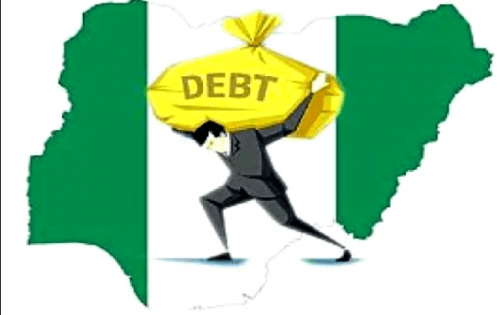
Ibadan
Before we start to look into the ways to tackle Nigerian debt profile, it is imperative to try to analyze the present position of our external debt and the rate at which it is increasing.
The country’s debt has grown by 214.9%, from N8.32 trillion in June 2013 to N26.2 trillion as of September 2019. Nigeria is a developing nation with a fast rising population of about 200 million people and it is in dire need of infrastructure development to boost the economy. From this angle, the high debt level seems justified. However as of March 31, 2021, Nigeria’s total public debt stock was N33.107 trillion, or USD87.239 billion. Between the end of the first quarter and the end of the second quarter, the debt stock increased by N2.358 trillion. This is huge. The upsurge in the debt profile is not healthy for the economic situation of the country.
However, a litany of constraints has prevented Nigeria from achieving the necessary level of investment and growth, despite its significant borrowing. Examples of these constraints include excessive government spending, mismanaged funds and unproductive borrowing, exchange rate volatility, low interest rate movements, inefficient loan utilization, and poor debt management practices to name a few. As a result, the ever-increasing government spending is yet to yield any notable results; poverty is on the rise and health and educational facilities remain inadequate amid the fast growing population. Debt service has become a significant portion of the expected revenue in 2020. To manage Nigeria’s existing debt profile, the Debt Management Office (DMO) adopted a debt strategy from 2016 to 2019 focusing on increasing external financing and lengthening the maturity profile of the domestic debt portfolio. The focus on external financing aims to rebalance the public debt portfolio in favor of long-term external financing. This would allow Nigeria to reduce its debt servicing costs and lengthen its maturity profile. On the domestic front, it also lengthened its maturity profile by reducing the issuance of new short-dated debt instruments and refinancing maturing Nigerian treasury bills (NTBs) with external financing.
To tackle the issue of rising debt, Nigeria can leverage on its capability to generate revenue internally through its abundant natural and human resources. Focusing on sectors like agriculture and tourism, as well as empowering its large youth population, Nigeria can diversify its revenue base, rely less on foreign inflows and loans, reduce the debt balance and boost domestic economic activities. The government’s efforts to generate more revenue from alternative sources should be intensified in order to prevent an unnecessary debt burden on future generations. It is vital to employ proactive measures to reduce the current debt level. Investment in key sectors should be prioritized and incentives such as low interest capital should be provided to boost participation and productivity. Also, providing incentives to increase participation in agriculture should be followed by improvement in infrastructure such as roads and irrigation facilities.
Nigeria’s total borrowing as a proportion of gross domestic product (GDP) as released by the International Monetary Fund is about 34.3%. Compared with almost 60% for South Africa, this ratio is quite low. However, acquiring more debt would weigh on this ratio especially if it does not result in a significant boost in GDP growth. Therefore, it is imperative that the government ensures effective utilization of loans in order to drive productivity and increase revenue domestically. Also, in the case that additional external debt is contracted, available concessions should be considered while realistic and favorable terms of repayment should be agreed upon. Doing this would allow the government to retain enough earnings, and to invest in the empowerment of citizens, poverty alleviation, infrastructural development and the promotion of trade to boost the nation’s economy.
Ibadan
The key to servicing our debt and generating revenue to better our economy is to invest in people and empower sectors like agric, health, mining, alternative medicine, education and digitization. The Federal Government must stop borrowing because it is impoverishing future generations. Use recovered loot to service debt, and use internally generated revenue to sustain the nation. Also, if we can focus on our natural resources like in the oil and gas sector, we will not need to keep borrowing. Also, there is need to manage what we have and find ways to allocate it properly and efficiently.
The way out is for the Federal Government to focus on how the money borrowed will be utilized. The government should be mandated to channel the borrowed funds toward improving education, agric expansion, healthcare and infrastructure. All these would be able to channel in funds into the country.
Ilorin
Nigeria has all it takes to be independent. If we pay attention to our agric sector and we do all within our power to kill corruption, encourage farmers and put in place all they need, we wouldn’t have to be in debt.
Lagos
As a country, the challenge we have had is not the fact that we borrow, but the economic benefits that we derive from the debts we raised. So, it is not the fact that we borrowed, but what we did with the money. If we can be consistent about ensuring that the money is invested in infrastructure or in sectors that would ensure that there are derivable and tangible benefits in terms of economic growth, job creation and others, that in itself is not a bad thing. That is because when the economy grows, and those jobs are created and productivity improves, the government gets additional revenue in terms of taxes and so on and that improves its capacity to repay.
Lagos
If the Federal Government decides to invest in a lot of these critical infrastructures, the evidence is there that it will stimulate economic growth if we invest in things such as power, transport infrastructure, and others. The economy would be experiencing double-digit growth if all these are put in place and we would be able to be out of debt and if investments done are properly put in place, there would be no need to go into debt.
Lagos
The country’s debt situation is worrisome. One of the key ways to get an economy out of recession is to spend your way out. These spending should help create the highest growth impact and stimulate economic activities, thereby leading to expansion in the Gross Domestic Product (GDP) and increase government revenue. The anticipated increase in revenue would in turn lead to new capital investments in the economy and would then enable the government pay back the principal and interest on these borrowed funds.
Ilorin
Having wasted numerous opportunities to proactively and decisively confront the issues responsible for this poor state of financial affairs, there is now an urgent call to leadership at the federal and state levels to embark on fundamental and structural changes to address this debt crisis. In addressing the situation, the first good move would be to plug all major revenue leakages and therefore reduce the government’s dependence on debt financing. There is need for increased investments, especially in critical sectors such as power. The long-term impact for the power sector is the increased availability of power and the huge multiplier effect of that on the productive sector and overall GDP. Each of the 36 states in Nigeria has massive natural resources that remain relatively docile; the government must fast-track initiatives that would unlock the private-sector-driven potentials in these sectors, provide enhanced tax revenues to government and drive up overall GDP. I believe with all these put in place, we should be out of debt in no time.
Osun
The Federal Government needs to determine its financing needs, set its borrowing limits and then comply with the Fiscal Responsibility Act. To reset the Nigerian economy, a major policy repair to reduce revenue vulnerabilities and budget deficits that jeopardise the economy must be implemented as fast as possible.
Port Harcourt
The Federal Government should adopt tough but necessary policy choices in order to improve on its revenue and reduce its dependence on foreign and local loans to fund budget deficit.
I will suggest a drastic cut in the running cost of governance, reduction in recurrent expenditure, as well as removal of subsidies in electricity and petroleum products, as a way of reducing the debt burden.
Lagos
All forms of foreign loans should be prohibited. Pressure should be mount on the National Assembly to henceforth reject any loan request from the federal and state governments. So, how will the Buhari government cover budget deficits and fund projects if foreign loans are stopped? It is very simple. The government can increase its revenue by genuinely tackling diversions of revenues and corruption in revenue-generating agencies. This is the way forward.
Copyright Ships & Ports Ltd. Permission to use quotations from this article is granted subject to appropriate credit given to www.shipsandports.com.ng as the source.

